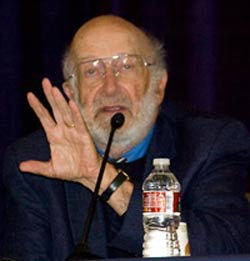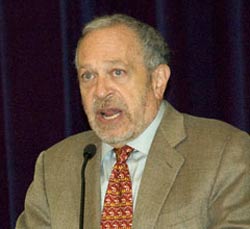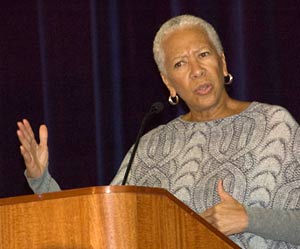What’s the future of public universities? Forum seeks way forward
The role of public higher education in fostering social opportunity and social mobility was the focus of an Oct. 25 campus forum on the future of public universities. It was the first of four public conversations organized by campus deans, at what they called "a definitional moment" for the institution.
October 27, 2011
“Rumors that the public university is almost a thing of the past” drew grad-student adviser Lynn Keithlin to an Oct. 25 campus forum on the future of public universities. “It’s almost frightening. I have a grandchild now; I have to think about these things,” said the chemistry-department staffer.

Peter Schrag, California political expert
The historic role of public higher education in fostering social opportunity and social mobility was the focus of Tuesday’s event in Pauley Ballroom — the first of four public conversations organized by the deans of the campus’s colleges and professional schools at “a definitional moment” in campus history, as they put it. The goal, said moderator Jennifer Wolch, dean of the College of Environmental Design, was to take stock of this existential crisis and “find ways to move forward.”
Speaker Peter Schrag — an expert in California politics and one of three featured speakers — praised the state’s aspiration, in the latter half of the 20th century, to bring its “great diversity of people to a high level of achievement” through educational opportunity. At or near the top of the heap, by many indicators, in those years, California is now a bottom feeder, he said — ranking, for example, 46th out of 50 states in K-12 spending per pupil, and 50th in students per teacher and students per librarian.
Once “a positive example for the world,” he said, “we are now an example of a different sort.”
Why public support for public education has eroded was one of the central questions of the day. Schrag cited a huge, ongoing demographic shift in California, from a majority white to a “majority minority” population. Consequently, the state’s traditional voters — still markedly older and whiter than the population as a whole — may have lost their enthusiasm for funding public education, he suggested. When the beneficiaries look like “your sister, son or brother,” you may be more generous, he said.

Robert Reich, professor of public policy
A vicious cycle?
For public-policy professor and former U.S. Secretary of Labor Robert Reich — who jokingly dubbed himself not a “class warrior” but a “class worrier” — answers lie in the nation’s growing wealth disparity and the declining economic fortunes of the middle class.
“It’s not that the American public became less generous or necessarily more intimidated by diversity,” Reich said. Rather, in the face of globalization and technological change that eroded wages and shed good-paying jobs, the middle class “lost its capacity” to pay taxes to fund public services. And the politically influential upper middle class, in turn, lost faith in the quality of public provisions — “seceding from the commons” in favor of private schools and services for itself. In that way, he suggested, a vicious cycle was born.
Call to action
Reich faulted California’s business leaders — including titans in technology, venture capital and entertainment — for not forcefully articulating a defense of public education. And he challenged members of the campus community to take action.

Angela Glover Blackwell, PolicyLink founder and Cal alum
“Regardless of the quality of people you’ve got in government,” he said, “nothing good happens” unless those outside of government “are mobilized, organized and energized to push the people inside to do the right thing.”
That call to action was echoed and amplified by Angela Glover Blackwell, founder and CEO of the non-profit PolicyLink and former Rockefeller Foundation vice president. It “takes a movement” to move forward, she stressed.
Blackwell, who earned her law degree at Berkeley, detailed and celebrated the rapid browning of California and the nation — a development, she said, that presents a great opportunity for the nation, should it choose to help the emerging new majority succeed.
“Our future … is a 7-year-old Latina, a 12-year-old black boy, a 17-year-old Asian girl,” she said. If we “make the commitment to invest in them… we become a world nation” and a world leader.
A thirst for concrete advice on how to help rebuild public support for public education were evident in questions from the floor. Blackwell urged students, at this moment, not to reflexively “occupy,” referring to the Occupy Wall Street movement, but to thoughtfully identify concrete goals.
“Pick something you can win,” she urged, as there’s nothing like a victory “to create momentum.”
The forum was endorsed by the Offices of the Chancellor and Executive Vice Chancellor & Provost, the Academic Senate, the Associated Students of the University of California, Berkeley Staff Assembly and the Graduate Assembly. Taxation and citizenship will be the theme of the next forum in the series, in early December, followed by two spring-semester events.
‘Get involved in the future of UC,’ say campus deans
“Our campus is at a definitional moment in its history. In the past few years, Berkeley, the University of California, and public universities nation-wide have experienced a massive disinvestment in public higher education that calls into question the very notion of these universities as public institutions. … The Deans of Berkeley’s Colleges and Professional Schools believe it is imperative for academic leaders and public intellectuals to join together to meet the challenge: to define our character, our mission and our contributions to public life.” … Read more on “Future of Public Universities” website